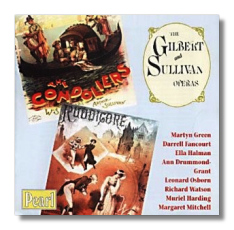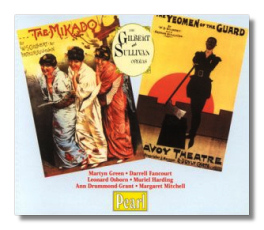
The Internet's Premier Classical Music Source
Related Links
- Latest Reviews
- More Reviews
-
By Composer
-
Collections
DVD & Blu-ray
Books
Concert Reviews
Articles/Interviews
Software
Audio
Search Amazon
Recommended Links
Site News
 CD Review
CD Review
Gilbert & Sullivan

The Gondoliers & Ruddigore
- Martyn Green (Duke of Plaza Toro/Robin Oakapple)
- Muriel Harding (Gianetta)
- Yvonne Dean (Tessa)
- Margaret Mitchell (Casilda; Rose Maybud)
- Leonard Osborn (Marco Palmieri/Richard Dauntless)
- Alan Styler (Giuseppe Palmieri)
- Ella Halman (Duchess of Plaza Toro/Dame Hannah)
- Ann Drummond-Grant (Mad Margaret)
- Darrell Fancourt (Sir Roderic Murgatroyd)
- Richard Watson (Don Alhambra del Boléro/Despard Murgatroyd)
- Henry Goodier (Luiz)
- Radley Flynn (Old Adam Goodheart)
D'Oyly Carte Opera Company/Isidore Godfrey
Pearl GEMS 0135 ADD monaural 3CDs 55:48, 58:21, 51:14


The Mikado & The Yeomen of the Guard
- Martyn Green (Ko-Ko/Jack Point)
- Muriel Harding (Elsie Maynard)
- Margaret Mitchell (Yum-Yum)
- Leonard Osborn (Nanki-Poo/Colonel Fairfax)
- Alan Styler (Pish-Tush); Ella Halman (Katisha/Dame Carruthers)
- Ann Drummond-Grant (Phoebe Meryll)
- Joan Gillingham (Pitti-Sing)
- Joyce Wright (Peep-Bo)
- Darrell Fancourt (Mikado of Japan/Sergeant Meryll)
- Richard Watson (Pooh-Bah/Wilfred Shadbolt)
- Radley Flynn (Go-To)
D'Oyly Carte Opera Company/Isidore Godfrey
Pearl GEMS 0134 ADD monaural 3CDs 50:44, 67:07, 52:11
The D'Oyly Carte Opera Company stayed out of the recording studios during World War Two. By the time the war was over, their most recent recordings of Gilbert and Sullivan's operettas were not very recent at all. Furthermore, the writing was on the wall for the 78-rpm record, and Decca saw the artistic and commercial value of having the D'Oyly Cartes – who had premièred G and S's operettas in the previous century – record them for the new medium. A new series of recordings was begun in 1950, and it continued until the middle of that decade. Once this series was completed, new technological improvements were on the horizon, and the D'Oyly Cartes began a new series of G and S recordings in stereo, starting with The Mikado in 1957. The stereo recordings were the first to be reissued on CD, and the pre-World War Two recordings – fondly remembered for the singing of George Baker, among others – were the next. The 1950s recordings have been in limbo: boasting neither modern sound nor superlative sentimental value, they have not appeared on CD until recently.
Pearl has taken up the cause, and these two sets join Pearl GEMS0097 (Trial by Jury and Pirates of Penzance) and GEMS0096 (H.M.S. Pinafore) in preserving artifacts from this era in D'Oyly Carte history. For many collectors, the reason for collecting these sets can be expressed in a single name: Martyn Green. Green was his era's master of the roles previously sung by George Baker, and later sung by John Reed. Green's warm baritone voice qualified him to be singer first and an actor second, but, because of his dramatic talents, he managed to give these roles equal priorities. He always created sympathy for his characters, even the curmudgeonly King Gama from Princess Ida, and he understood how effective it was to create a serious moment in an evening of humor – for example, in "On a tree by a willow" from The Mikado. One almost takes his implied suicide threat at face value – as did his Katisha, apparently! His diction, even in the most demanding patter songs, was wonderful. He is the best reason to hear these recordings, even though they are more than a half-century old now.
These four recordings date from 1950. Apparently it was not unusual at this time to record an entire operetta in a single day, and the results, understandably, were sometimes less than ideally polished. The Gondoliers was recorded on March 11. The D'Oyly Cartes had not recorded The Gondoliers since 1927, a superb recording which remains available on Pearl, and in Jim Lockwood's 78s 2 CD series. (There are no overlaps between the 1927 and 1950 casts.)
Although the1950 Gondoliers, as with the other three recordings, often sounds like a seat-of-the-pants, "no retakes, please" affair, it has many strengths, not least Godfrey's alert conducting. Green is in top form as the Duke, and Alan Styler's warm baritone makes him an attractive Giuseppe, but he was unlucky to draw the hollow-toned Yvonne Dean as Tessa. (Dean may have been an understudy for another singer, because she doesn't appear in a starring role on any other recording.) Muriel Harding sings Gianetta's solos, including "Kind sir, you cannot have the heart," with edgy charm. Margaret Mitchell's Casilda and Richard Watson's Don Alhambra are dependable, as is Ella Hallman's Duchess – not her finest role on records. Leonard Osborn strains and is graceless as Marco. He is a consistent liability in this series of recordings. (I understand that he was easier on the eyes than on the ears.) Henry Goodier, like Dean, is an unfamiliar name, but he is rather more successful with Luiz, and he is the baritone that Sullivan requested. (For some reason, this role is often given to a tenor.) Pearl maintains an idiosyncrasy of the original Decca release by including Stanley Youngman's name (as Annibale) in the cast list. This is a spoken role, and so it doesn't make much sense to include it in a recording that omits the dialogue! Probably staff members at Decca simply copied it from a contemporary D'Oyly Carte cast listing without realizing their error. As for the sound quality, this is a recording that sounds older than its age, thanks to the distortion at climaxes and the pervasive hum.
Ruddigore, recorded several months later, is a better piece of engineering than The Gondoliers, but it still falls short of what record companies (including Decca) were capable of at that time.As usual, Godfrey is dependable if not imaginative. Unfortunately, this recording preserves the cuts that were standard at the time, including all of "The battle's roar is over." This is particularly sad, because the most frequently made comment about this Ruddigore is how good Osborn sounds as Richard Dauntless. Sullivan keeps Dauntless's music in a comfortable range, and Osborn gets to hide some of his shortcomings behind a mask of comedy. Green is a mature Robin, and he sounds happier when he transformed into Sir Ruthven Murgatroyd. It is astonishing to hear him sing his section of the Act Two patter trio in a single breath. Darrell Fancourt, quavery of voice but strong of spirit, sings a memorable "When the night wind howls," and Richard Watson seems to enjoy the comic frights of "Why am I moody and sad?" (If you like Fancourt's Roderic, the 1931 D'Oyly Carte recording is available from 78s 2 CD. Fancourt is the only lead to appear on both the 1931 and 1950 recordings.) Among the women, Mitchell is the best. Her reading of "If somebody there chanced to be" is rich in charm. Halman's Dame Hannah, like her Gondoliers Duchess, is hampered by unsteadiness and a generic interpretation. Ann Drummond-Grant (Godfrey's wife) is nothing special as Mad Margaret.
The Mikado was recorded on March 8. Osborn must have had a cold at the time, because his strangled and out-of-tune rendition of "A wandering minstrel I" is the poorest I've heard on record. (Fortunately, he improves later on.) The other weak link here is the sound quality. Climaxes are overloaded to the point of distortion, several side-joins are poorly managed (Katisha's first entrance is an egregious example), and wow and flutter are recurring problems. On the plus side, Green's Ko-Ko is sung with enormous wit and personality. Still, he turns the tables on Katisha (and on us) by singing the "Tit-Willow" song with almost tragic earnestness. Halman's Katisha is her strongest role on records; she is both fearful and sympathetic. Fancourt's earlier (1936) recording of the title role is more strongly sung, but not more charismatic. (Green also participated in the 1936 recording.) Although it is not a highly individual interpretation, Mitchell's Yum-Yum is enjoyable, at least when the recording is not distorting her high notes. Styler uses his nasal (but not unpleasant) baritone voice to good effect in "Our great Mikado," and Richard Watson is a rich-voiced and pompous Pooh-Bah. Go-To is split between Radley Flynn and Donald Harris; Pearl gives credit to the former only.
The Yeomen of the Guard, the most operatic of Sullivan's scores with Gilbert, and the most serious of Gilbert's librettos, has been lucky on records. The recording preserved here (July 18 was the recording date) is a successful team effort, and noteworthy for Martyn Green's Jack Point, a heartbreaking characterization even in the absence of histrionics. Nevertheless, his comic solos ("I've jibe and joke" and "Oh! A private buffoon") are both memorable and musical. Osborn, with his typically sluggish sense of rhythm, makes heavy weather of "Is life a boon?" and his portion of "A man who would woo a fair maid." Fancourt does not have to compete against his younger self here, because the previous D'Oyly Carte version (from 1928) assigned Sergeant Meryll to Peter Dawson. Among the women, Halman is the real star; her Dame Carruthers is imposing. Drummond-Grant sounds a little lost as Phoebe (she did not sing this role on stage), and Harding's Elsie Maynard is quavery and a poor match for Green's Jack Point. The engineering shares many of the drawbacks of the earlier three, but at least it is a little more brilliant.
The layout of these discs is bizarre. The first act of each opera gets a CD to itself, but the second acts are placed back to back on a separate CD. In other words, if you simply load these disc into your player without programming it first, you'll hear the first opera in the set in its proper order, but then you'll hear the second act of the next opera before you hear the first. Pearl did this to avoid breaking the acts up between discs. Whether this is an advantage or not I leave up to you. Annotations are by Marc Shepherd, whose excellent G and S discography on the Internet is required reading for anyone who has gotten this far in my review!
In short, listeners who are new to G and S should choose stereo recordings, preferably those by the D'Oyly Cartes. These recordings will appeal to collectors who are confirmed G and S fans, particularly to those who want to hear why Martyn Green was such a beloved Savoyard.
Copyright © 2001, Raymond Tuttle


















